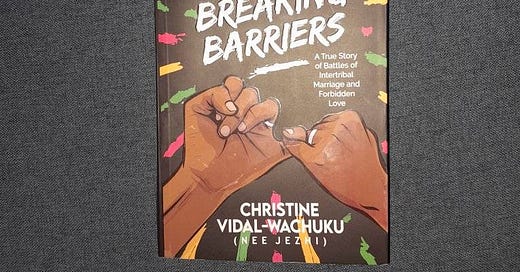Book Review: Breaking Barriers by Christine Vidal Wachukwu
A good story is a type that you read and fall into the emotions as they flow. This is one of them. I was laughing, I was angry, I was condescending, I was sad, I was happy…. All.
A good story is a type that you read and fall into the emotions as they flow. This is one of them. I was laughing, I was angry, I was condescending, I was sad, I was happy…. All.
The real heroes of this nation whose umbilical cord is tied to their religions and tribes are the people, who at a young age, went against the customs of their religion or tribe to marry another tribe. They are the real heroes, more than laws or legislation. When we are ready to build a nation, stories like this of Christine Vidal Wachuku and Vidal Wachuku will become staples we will share all around. They will become the pillars that lay the foundation for a nation where men and women will be judged by the content of their character and their skills/knowledge.
Unfortunately for us, we will not have many stories like this, because they are rarely written. Perhaps this is what makes the effort of the author more commendable.
Her narrative was spellbinding. From the moment I started till the moment I finished; I couldn’t drop the book. It was that good. She had a way of describing ordinary things in profound ways. For instance, read this description of the pounded yam she did… “One could not blame him. Gbagyi pounded yam is second to none. They pound for several minutes until it forms a thick paste. Then they add water from the cooked yam intermittently as pounding continues until they achieve the desired texture of almost viscous, light, soft, stretchy, and silky smooth.”
When I read this, my brain was asking me if this is the same pounded yam I know that was been described here. The author is a great storyteller. She was able to fuse Nigerian pidgin in a way that did not dislocate the reading. In a way, if you wanted to learn Igbo or Gbagyi, you can begin with this book. She wrote so many words in those dialects with their explanations.
An important part of this book was the letters exchanged between her and Vidal. Remember this story happened in the 1970s-1980s. Omoh. Mehn. You see love. Love in Tokyo. The letters were beautifully written, with passion and strong purpose. There was love everywhere, even with the hurdles they faced. If I read their letters alone, it will be clear how much they love each other. I was bamboozled by “Love”, “Darling”, “My love”, I even saw “Darling Baby”, I decided to count the number of times these words appear on a single page in one of the letters. Do you know how many? 11! The page had 22 lines. That’s to say there was one sweet word on every 2 lines of a 22 lines work. The love was real, and it still is!
Their love did not just love. It was a love rooted in Jesus. They loved their God more than anything. This love flowed out to each other. It was what sustained them till they got what they wanted. I think of the implications of this. Love is the most powerful weapon in the world. It changes people, it changes cultures, and it changes the trajectory of events. Their story proves that. They broke barriers because of their love.
I believe that the same love could break the barriers all across the nation. We need more heroes like this. We need more tales like this. They are the fabric that will make our nation stay.
I also see this book as a family history achievement. When I read books of history like the biography of Abrahan Lincoln, what I see is that historians have to depend on the family history written by members of the family to define the culture and to give a picture of that era. This book has achieved that for both the Wachuku family (maybe not much) and the Daudu Jezhi family. Now, the Vidal and Christine family have been etched in history. They are not just family tales, it is a books. It will always be on record. The next 5 generations (and millions more) can go back to it and read it. It cannot be lost.
I will end these thoughts by asking you two questions, 5 generations from now, will there be a record of your family history? This book has challenged me. I am writing a family history too.
The second question is a national question if Christine and Vidal could get married and get along, and build a beautiful marriage, what is stopping us from building a united nation? Why can’t we learn from what love can do for two individuals?
We can rise out of our suspicions of each other and do something beautiful for this nation. We all don’t deserve the tragedy of our divisions.
You should read this book, you will enjoy the storytelling and it will challenge your perspective.
Thank you Christine Vidal-Wachuku for writing this book. One day, Nigeria will become a united nation, and this book will be one of those tools that will be held as the tools that bridged the people and united us!





Love is really a beautiful thing. I see it as a gateway to unity which leads to great achievements.with love unity will be attained and with unity nothing is unachievable even in building and restructuring a county like ours.
Thank you for sharing this on little ends.